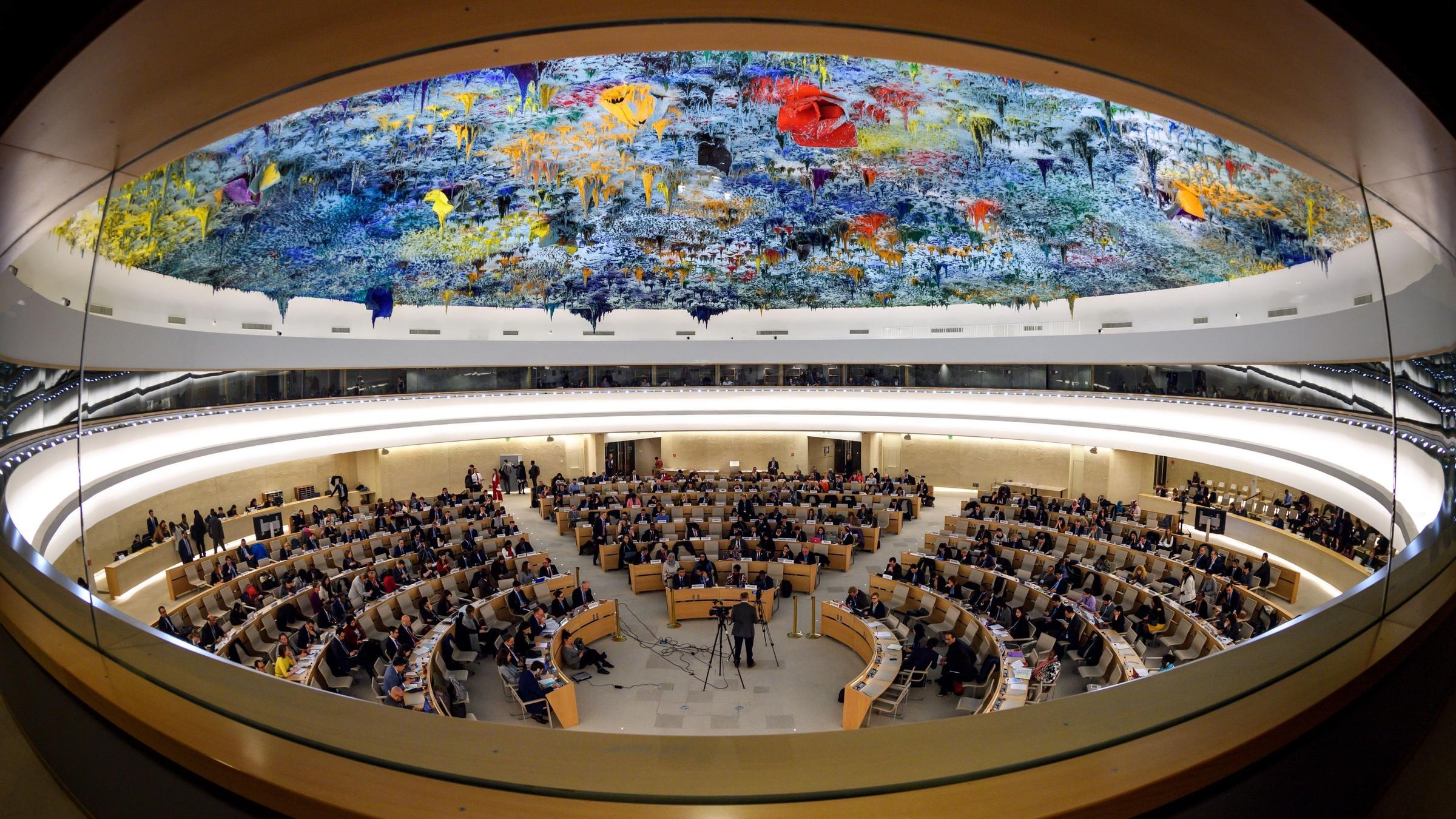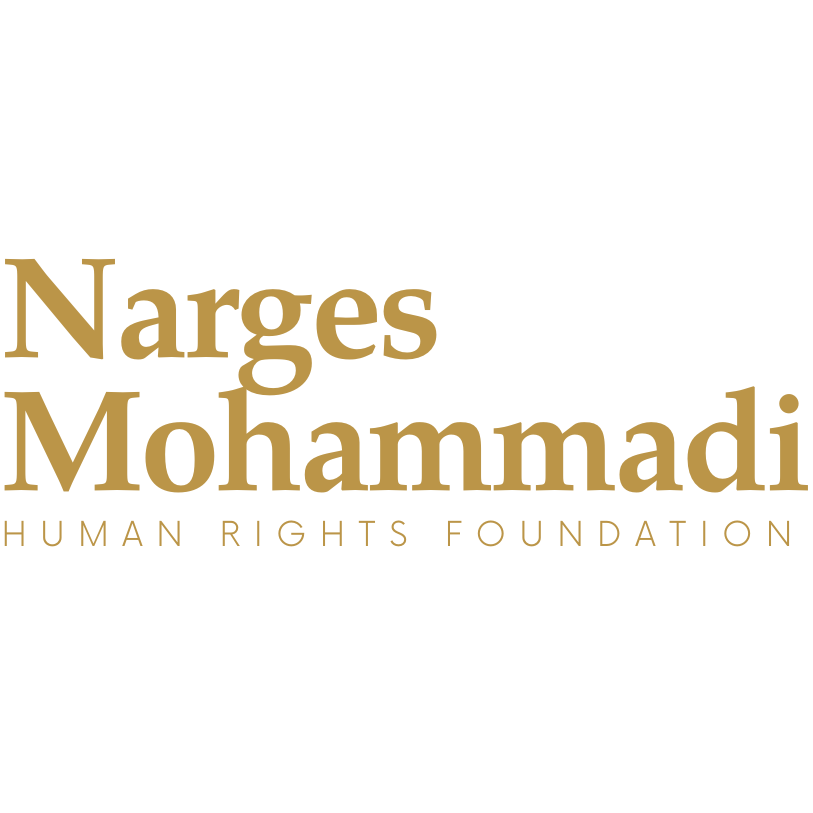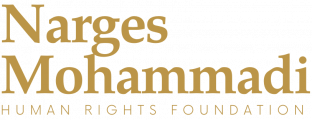
Iran must end harassment of Narges Mohammadi and release all women human rights defenders: Independent Experts
GENEVA (27 June 2024) – A group of independent experts are urging the Islamic Republic of Iran to immediately and unconditionally release Narges Mohammadi and all women human rights defenders, who remain in jail on charges relating to their defence of human rights.
“We are alarmed about the unfair proceedings and lengthy sentences handed to human rights defender, Narges Mohammadi, directly related to her peaceful exercise of her rights to freedom of expression and assembly in the pursuit of gender equality in Iran,” the experts said. “Unduly covering charges under the framework of “national security” or “propaganda against the state in order to silence critical voices” need to stop.”
Narges Mohammadi is serving multiple sentences amounting to more than 13 years of imprisonment. Her sentence was extended by an additional 15-months in January 2024 for new charges concerning “spreading propaganda against the state”. On 18 June, Branch 29 of the Tehran Revolutionary Court sentenced Mohammadi to one additional year in prison on the charge of “propaganda activities against the state.” This is her sixth conviction since March 2021, three of which appear to be in relation to her human rights activism in prison, including advocating for the rights of other female prisoners in relation to sexual offenses by government officials.
The Working Group on Arbitrary Detention has previously found, in its Opinion 48/2017, her detention arbitrary.
“We are deeply concerned about the climate of discrimination and fear that women human rights defenders’ live under in Iran,” the experts said.
They said this was compounded by the absence of a rules-based justice system that is gender-responsive and accessible to women, and by impunity for violations of the rights of women and girls.
“The extreme discrimination and violence against women and girls are unacceptable,” the experts said. “We wish to remind the Iranian Government of its obligation to protect and promote the rights of all human rights defenders as they peacefully carry out their legitimate work,” they said.
The experts also received disturbing reports that indicate that Narges Mohammadi has been denied access to her lawyer and prevented from contacting her family since 29 November 2023, shortly after having been awarded the Nobel Peace Prize. Even more worryingly, Mohammadi has reportedly been denied medical aid. They recalled that access to medical and legal support for detainees are fundamental rights and must always be respected.
Arrests of women’s rights activists have reportedly increased in recent years, with Iranian officials warning that other people protesting against the compulsory wearing of the veil may be charged with national security offences.
“Women human rights defenders challenging the imposition of a compulsory dress code on women are acting in defense of universally guaranteed human rights. We urge the government of Iran to remember that,” the experts said.
They recalled that the use of repressive legislation to criminalise the exercise of freedom of expression and peaceful assembly is incompatible with Iran’s obligations under international human rights law.
* The experts: Javaid Rehman, Special Rapporteur on the situation of human rights in the Islamic Republic of Iran; Mary Lawlor, Special Rapporteur on the situation of human rights defenders; Irene Khan, Special Rapporteur on the right to freedom of opinion and expression; Gina Romero, Special Rapporteur on the Rights to Freedom of Peaceful Assembly and of Association; Margaret Satterthwaite, Special Rapporteur on the independence of judges and lawyers; Dorothy Estrada Tanck (Chair), Laura Nyirinkindi (Vice-Chair), Claudia Flores, Ivana Krstić, and Haina Lu, Working group on discrimination against women and girls; and Matthew Gillett (Chair), Ganna Yudkivska (Vice-Chair on Communications), Priya Gopalan (Vice-Chair on Follow-Up), Miriam Estrada-Castillo and Mumba Malila, Working Group on Arbitrary Detention; Nazila Ghanea, Special Rapporteur on freedom of religion or belief.
The Special Rapporteurs and Working Groups are part of what is known as the Special Procedures of the Human Rights Council. Special Procedures, the largest body of independent experts in the UN Human Rights system, is the general name of the Council’s independent fact-finding and monitoring mechanisms that address either specific country situations or thematic issues in all parts of the world. Special Procedures’ experts work on a voluntary basis; they are not UN staff and do not receive a salary for their work. They are independent from any government or organization and serve in their individual capacity.
UN Human Rights, Country Page — Iran
ژنو (27 ژوئن 2024) – گروهی از کارشناسان مستقل سازمان ملل از جمهوری اسلامی میخواهند که نرگس محمدی و تمامی مدافعان حقوق بشر زن را که به دلیل دفاع از حقوق بشر در زندان به سر میبرند، فوراً و بدون قید و شرط آزاد کند.
کارشناسان گفتند: “ما نگران روندهای ناعادلانه و احکام طولانیمدت صادره برای مدافع حقوق بشر، نرگس محمدی هستیم که مستقیماً به دلیل فعالیتهای مسالمتآمیز او در دفاع از حق آزادی بیان و فعالیت در جهت برابری جنسیتی در ایران صادر شده است. متهم کردن ناعادلانه او به بهانه امنیت ملی و تبلیغات علیه نظام به منظور خاموش کردن صداهای منتقد باید متوقف شود.”
نرگس محمدی چندین حکم زندان به مجموع بیش از 13 سال را میگذراند. در ژانویه 2024، حکم او به دلیل اتهامات جدید مرتبط با “تبلیغ علیه نظام” 15 ماه دیگر تمدید شد. در 18 ژوئن، شعبه 29 دادگاه انقلاب تهران محمدی را به یک سال دیگر زندان به اتهام “فعالیت تبلیغی علیه نظام” محکوم کرد. این ششمین محکومیت او از مارس 2021 است که به نظر میرسد سه مورد آن به فعالیتهای حقوق بشری او در زندان، از جمله دفاع از حقوق سایر زندانیان زن در رابطه با جرایم جنسی توسط مقامات دولتی مرتبط باشد.
کارشناسان سازمان ملل قبلاً در گزارشات خود در سال 2017 بازداشت نرگس محمدی را محکوم کرده بود.
کارشناسان می گویند: «ما به شدت نگران وضعیت تبعیض امیز و ترسناک مدافعان حقوق بشر زن در ایران هستیم.»
آنها گفتند که این وضعیت با عدم وجود یک سیستم قضایی مبتنی بر قوانین بین المللی که پاسخگوی تعرضات جنسی و در دسترس زنان باشد و عدم پاسخگویی به نقض حقوق زنان و دختران تشدید میشود.
کارشناسان گفتند: «تبعیض و خشونت شدید علیه زنان و دختران ایران غیرقابل قبول است. ما میخواهیم به دولت ایران یادآوری کنیم که موظف است از حقوق همه مدافعان حقوق بشر که به طور مسالمتآمیز کار مشروع خود را انجام میدهند، حمایت کند.»
کارشناسان همچنین گزارشهای نگرانکنندهای دریافت کردهاند که نشان میدهد نرگس محمدی از دسترسی به وکیل خود و تماس با خانوادهاش از 29 نوامبر 2023، اندکی پس از دریافت جایزه نوبل صلح، محروم شده است. حتی نگرانکنندهتر این است که محمدی سال هاست از دریافت کمکهای پزشکی نیز محروم شده است. آنها یادآوری کردند که دسترسی به حمایتهای پزشکی و حقوقی برای بازداشتشدگان حقوق اساسی است و همیشه باید رعایت شود.
گزارشها حاکی از افزایش دستگیری فعالان حقوق زنان در سالهای اخیر است و مقامات ایرانی هشدار دادهاند که افراد دیگری که علیه حجاب اجباری اعتراض میکنند، ممکن است به اتهامات امنیت ملی متهم شوند.
کارشناسان گفتند: “مدافعان حقوق بشر زن که علیه تحمیل کد لباس اجباری به زنان مبارزه میکنند، در دفاع از حقوق بشر جهانی عمل میکنند. ما از دولت ایران میخواهیم که این را به خاطر بسپارد.”
آنها یادآوری کردند که استفاده از قوانین سرکوبگرانه برای جرمانگاری آزادی بیان و تجمع مسالمتآمیز با تعهدات ایران تحت قوانین بینالمللی حقوق بشر ناسازگار است.
* کارشناسان و نویسندگان این بیانیه: جاوید رحمان، گزارشگر ویژه وضعیت حقوق بشر در جمهوری اسلامی ایران؛ مری لاولور، گزارشگر ویژه وضعیت مدافعان حقوق بشر؛ ایرنه خان، گزارشگر ویژه حق آزادی عقیده و بیان؛ جینا رومرو، گزارشگر ویژه حقوق آزادی تجمع مسالمتآمیز و انجمن؛ مارگارت سترثویت، گزارشگر ویژه استقلال قضات و وکلا؛ دوروتی استرادا تانک (رئیس)، لورا نیریکندی (معاون رئیس)، کلودیا فلورس، ایوانا کریستیچ، و هاینا لو، گروه کاری تبعیض علیه زنان و دختران؛ و متیو گیلت (رئیس)، گانا یودکیفسکا (معاون رئیس در ارتباطات)، پریا گوپالان (معاون رئیس در پیگیری)، میریام استرادا-کاستیلو و مومبا مالیلا، گروه کاری بازداشتهای خودسرانه؛ نزیلا غنیا، گزارشگر ویژه آزادی مذهب یا عقیده.
گزارشگران ویژه سازمان ملل بخشی از آنچه به عنوان متد های ویژه شورای حقوق بشر شناخته میشود، هستند. این گروه بزرگترین بدنه کارشناسان مستقل در سیستم حقوق بشر سازمان ملل است که به طور کلی به عنوان مکانیسمهای تحقیق و نظارت مستقل شورا که به وضعیتهای خاص کشور یا مسائل موضوعی در همه نقاط جهان میپردازند، شناخته میشود. کارشناسان به صورت داوطلبانه کار میکنند؛ آنها کارمندان سازمان ملل نیستند و برای کارشان حقوق دریافت نمیکنند. آنها مستقل از هر دولت یا سازمانی هستند و در ظرفیت شخصی خود خدمت میکنند.


